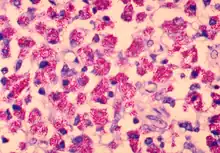Mycobacterium avium avium
| Mycobacterium avium | |
|---|---|
 | |
| Scientific classification | |
| Domain: | |
| Phylum: | |
| Class: | |
| Order: | |
| Family: | |
| Genus: | |
| Species: | M. avium |
| Trinomial name | |
| Mycobacterium avium Chester 1901, ATCC 25291 | |
Mycobacterium avium is a species of the phylum Actinobacteria (Gram-positive bacteria with high guanine and cytosine content, one of the dominant phyla of all bacteria), belonging to the genus Mycobacterium.
The type strain is ATCC 25291 = CCUG 20992 = CIP 104244 = DSM 44156 = NCTC 13034.
The subspecies name Mycobacterium avium subsp. avium Chester 1901 is automatically created by the valid publication of Mycobacterium avium subsp. paratuberculosis (Bergey et al. 1923) and the valid publication of Mycobacterium avium subsp. silvaticum Thorel et al. 1990.[1]
Based on differences in IS1245 RFLP, 16S-23S rDNA ITS and growth temperature, Mijs et al. 2002[2] propose to reserve the designation Mycobacterium avium subsp. avium for bird-type isolates. These authors suggest, but do not formally propose, the designation "Mycobacterium avium subsp. hominissuis" for the isolates from humans and pigs.
Epidemiology
Present mainly in cattle and humans with an immunocompromised disorder, e.g. AIDS, it is transmitted to man by drinking unpasteurized cow milk. Pigs are susceptible to M. avium avium , M. bovis, and M. tuberculosis, with M. avium being most common. Lesions are typically lymphoid, gastrointestinal, or rapidly progressive disseminated forms. Intradermal testing is the diagnostic test of choice. Isolation of purified protein derivatives is useful for M. bovis and M. tuberculosis. However, cross-reaction between M. avium avium, M. tuberculosis, or M. avium paratuberculosis is a disadvantage.
Dogs, cats, deer, mink, cattle, birds (serotypes 1, 2, and 3) and some cold-blooded animals are all also susceptible to M. avium.
False-negative tuberculin tests are common in dogs. Radiographs and a thorough history are useful in diagnosis. Affected dogs should be euthanized because of public health concerns.
References
- ↑ Thorel (M.F.), Krichevsky (M.) and Levy-Frebault (V.V.): Numerical taxonomy of mycobactin-dependent mycobacteria, emended description of Mycobacterium avium, and description of Mycobacterium avium subsp. avium subsp. nov., Mycobacterium avium subsp. paratuberculosis subsp. nov., and Mycobacterium avium subsp. silvaticum subsp. nov. Int. J. Syst. Bacteriol., 1990, 40, 254-260.
- ↑ MIJS (W.), de HAAS (P.), ROSSAU (R.), VAN DER LAAN (T.), RIGOUTS (L.), PORTAELS (F.) and van SOOLINGEN (D.): Molecular evidence to support a proposal to reserve the designation Mycobacterium avium subsp. avium for bird-type isolates and 'M. avium subsp. hominissuis' for the human/porcine type of M. avium. Int. J. Syst. Evol. Microbiol., 2002, 52, 1505-1518.
J.P. Euzéby: List of Prokaryotic Names with Standing in Nomenclature - genus Mycobacterium